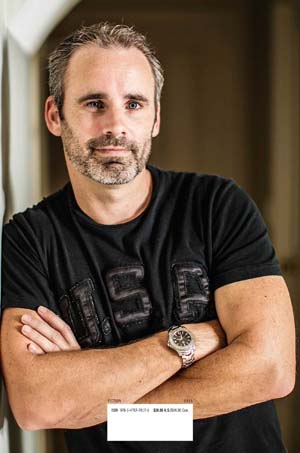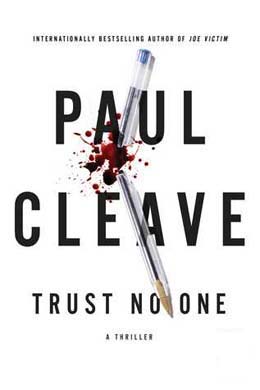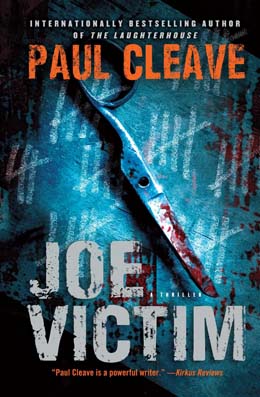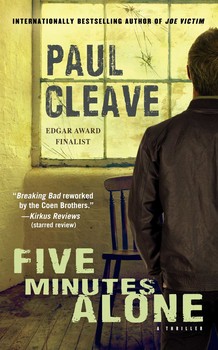From the Booking Desk:
Please join me in welcoming Paul Cleave to BOLO Books. Paul has written a series of loosely connected novels set in New Zealand and today marks the publication of his new stand-alone novel, Trust No One. Read on to find out how Paul organized this complex novel, what Paul fears the most at the moment and much much more.

BOLO Books: Your new novel, Trust No One, is a stand-alone psychological thriller. This arrives after a series of more traditional suspense thrillers, which are loosely interconnected. How was the process of writing this one different than your previous books?
Paul Cleave: It was actually really similar to the others. What’ll happen is I’ll have an idea for an opening chapter, and nothing beyond that – pretty much a ‘what if’ moment. I find writing ‘what if’ quite easy – but I find the ‘and then what happens’ really difficult. The ‘why’ is always so, so important. Serial killer out there targeting people? Okay, so why? How can I make him likeable? I know that’s 101 stuff, but it’s stuff I have to figure out along the way each time. I never plot anything out – I just keep pushing ahead – it’s kind of like I’m watching a movie in my head and just watch where the characters go, hoping there will be twists and turns along the way. Then I tidy it up at the end with rewrites. At any given point I maybe know what the next chapter will be – maybe two at the most – but for the most part I’m flying blind. All of that – it happened with Trust No One. It’s actually a really complicated novel – and I had a notebook by my computer the whole time I was scribbling in to keep up. It’s hard when you don’t know where a novel is going – even harder when your protagonist is suffering from Alzheimer’s and he doesn’t know where things are going either. It was, I must say, the most fun I’ve had writing – part of that was because I tried to make it really funny, but also because I could relate to the character in a more intimate way than others I’ve written about it. The prints in his office, the clothes he wears, the music he cranks up loudly to listen to while he writes – we have that in common. Who is Jerry Grey? He’s me. Kind of. If I had Alzheimer’s and thought I had killed people.
BOLO Books: Once again, your setting of choice is Christchurch, New Zealand. Besides the obvious – it’s where you are from – what is it about this setting that makes it so perfect for your novels?
Paul Cleave: It’s been a tough call to keep the books in Christchurch. With Trust No One, I actually considered setting it in NYC, or London, but ultimately I just love writing about Christchurch. Sure – I know the city well because I grew up here and still live here now, and I like to describe it in a way that brings the reader here in the books (but probably wouldn’t want to bring them here in real life) – but the thing is, Christchurch really does have that Gotham City side to it. It’s a picture-postcard city with a very dark underbelly. It’s also interesting because there aren’t many crime novels set in Christchurch – so it makes the books a little more unique.
The other thing that makes Christchurch work so well is its size. I can have a coincidence factor in there that I couldn’t put in a book set in a large city. The fact is we do run into people we know all the time here. If I go to a mall, I’m going to run into my dad, or my neighbor, or my buddy, or my buddy’s parents – that stuff just always happens. So in the books, the good guys and the bad guys can just run into each other and not know about it. I’ve spent a couple of years in London on and off, and never once did I bump into anybody I knew.
 BOLO Books: Trust No One deals with a main character who is in steady decline from early on-set dementia. What type of research did you do to prepare for such an undertaking?
BOLO Books: Trust No One deals with a main character who is in steady decline from early on-set dementia. What type of research did you do to prepare for such an undertaking?
Paul Cleave: Actually, all I did was spend a few hours online reading about Alzheimer’s and the diagnosis process, then print out a bunch of bullet points I could keep referring to. The book doesn’t rely on the scientific side of the disease – it’s all about Jerry and his family, and how his personality changes, so I didn’t have to get bogged down in the details, and nor did I have to make the reader feel like they were reading a medical journal. Because the brain is a weird and wonderful place, with some pretty random things going on, it meant there was no real road-map I had to follow – I could do my own thing and have Jerry progress in the way I wanted him to. Then I just went through a series of changes for him – funny, in the beginning – then a little heartbreaking – then paranoia – then, of course, criminal. Because half of the book is told through a diary he keeps (his Madness Journal) I was able to skip periods of time – which means the changes don’t have to be as subtle.
BOLO Books: Structurally, Trust No One is a very complex novel. How did you go about organizing yourself to write a book that essentially has no direct through-line? Because of Jerry’s condition, memories/hallucinations/dreams come and go at will and yet the reader needs something to guide them through all this.
Paul Cleave: This really was the toughest book I’ve written, and it took me a year to recover from it – that’s never happened before. I actually had the idea for it about six months before I started writing it – and the reason I couldn’t write it was because I couldn’t get it to work. I was always picturing it as very linear – but at what point to start it? If I started with his diagnosis, then it could get boring – if I started halfway through, then I’d be missing out on some really essential backstory. I’d always figured I’d be telling it through flashbacks, but I never quite liked that either. I remember waking up one summer morning 18 months ago, and bang – out of nowhere I had the idea for the diary. It changed everything. I could set the book now, with Jerry very sick, and I could put alternate chapters in there from the day he first finds out he has Alzheimer’s.
I wrote 40,000 words that week. It just flowed. I sat in my office with Springsteen cranked super loud, and I’d write for twelve or more hours a day bingeing on junk food and wiping ten years off my life expectancy. Again – none of it was plotted out – but I made more notes on this one than any other novel I’ve worked on. It was difficult keeping tabs on everybody – and on what was real and what wasn’t. As the novel progressed, I had the really cool idea of adding some chapters from Jerry’s pseudonym, Henry Cutter. He’d have the occasional chapter, or the occasional line or two – if Jerry was confused by something, he’d throw it over to Henry.
The book is structured in a way that I’ve never seen before – every second chapter with him talking to himself – to Future Jerry. Hey, Jerry, it’s me, Jerry from the past – I hate to tell you, but you have Alzheimer’s and here’s what you’re going to need to remember. It’s basically a guy talking to himself from the past. So it’s first person, second person, third person, then first person from Henry, second person from Henry, there are short stories from Henry – it sounds a little crazy, but boy it just gelled together so well – and gives the novel more of a frantic pace that gives you an idea just how Jerry is feeling. As the story progressed, my excitement for it just kept on growing – sure, the novel was complex, sure, I got fat writing it, but boy it was an exciting ride.
BOLO Books: Trust No One employs all manner of point-of-view techniques. Did you find that you preferred one over the others?
Paul Cleave: I think his journal entries are my favorite. Every book I’ve written has been first person – or shared with first person – and this one feels like it’s first person even though it’s not. I found by using the journal entries, and alternating them with what was happening now, and having the time lines catch up, I was able to have more cause and effect. I could set something up in a journal, and you’d know it was coming up in the ‘now’ chapters – or I could say something in the ‘now’ chapters, and you’d be like ‘oh no, this is going to come up in his journal in a moment – just what has Jerry done?’. By doing it that way you could also see a difference in the way he remembers things – and I could hide things from him and the reader.
BOLO Books: Jerry’s writing career was done under the pseudonym of Henry Cutter. Have you ever considered writing something under an assumed name? Why or why not?
Paul Cleave: I thought about it, way back ten years ago when I got my first contract. But a few people kept pointing out I had a great author name anyway – so I kept it.
BOLO Books: Tell me a bit about the process of creating Henry Cutter’s literary oeuvre. Was it fun to create these plots knowing that you didn’t actually need to write those novels?
Paul Cleave: Oh yeah, that really was fun! Like I say, the easiest part is coming up with a ‘what if’ moment – it’s all difficult after that. In this case I could write ‘what if’ moments and never think about them again. It’s kind of like a ‘Choose your own Adventure’ really – I can share a small element of a plot from one of his books, and the reader can wonder what happened and fill in the blanks.
 BOLO Books: There is some subtle commentary about the world of publishing today mixed into the thriller plot, especially in terms of reviewers and online commenting. Since this interview will be posted on a book review blog, can you talk a bit about that?
BOLO Books: There is some subtle commentary about the world of publishing today mixed into the thriller plot, especially in terms of reviewers and online commenting. Since this interview will be posted on a book review blog, can you talk a bit about that?
Paul Cleave: Ha! True – it is in there a little. When I was writing that book, Joe Victim had just come out. There’s a blogger who was often tweeting me about stuff – really friendly all the time – and I knew she was a reviewer, and in the end I was curious as to what she was saying about my newest book. She was nice to me – but it turns out not nice to the books – she was ripping into them. It was really dumb of me to let it get to me, but I was going through a really shitty time with other things in my life so it did, and therefore it got to Jerry too. Do people have to love our books? As awesome as that would be, the answer is no. Should they make room for the possibility that others might like our books? You know what? I think they should – and I think this is what separates really good book reviewers and bloggers from the not so good ones. I don’t like it when reviews are stated as fact – what I mean is they’ll say ‘this is a really bad book because I say it is and you shouldn’t buy it’, then people in the comments will go ‘oh, thanks for warning me, I love this guy and was going to get the book but I won’t now’. I have a friend who got hounded by one guy saying ‘you should really give up and not write any more books.’ That was on Amazon. This guy just kept coming for him ‘you’re useless, do us all a favor and never write another book’. Then I have another really good friend who got heaps of one star reviews before his book came out because it was too expensive (the pricing wasn’t set by him). ‘This is my favorite author, but I can’t believe the eBook is so much – one star.’ Bloody hell…
There are some that make me laugh, though. Like getting a one star because somebody ordered the book in the wrong language. ‘This is the Italian version! One star!’ Or the book showed up wet because it rained. I remember a review in a newspaper where the guy pretty much said ‘I don’t like crime novels, and here’s why I don’t like this one.’ I used Jerry a little to touch on that point, but he never dwells on it. He knows, just like I do, you can’t afford to.
Moving on a little from reviews, what concerns me the most these days are Internet Comments – and again I was able to use Jerry to show that a little. There’s a scene in the book where something he does during the grip of his Alzheimer’s ends up online, and the feedback is cruel. It seems these days if you say the most heartbreaking thing online, there will be somebody there to call you a loser. People say cowardly things they would never be willing to say to you in real life – there’s such a sense of disconnect between decency and empathy and what ends up being typed for the world to see. I guess what scares me is how quickly things have advanced with social media in the way people are so fast to pull on the trigger on saying something so offensive or abusive – and I wonder two things – just who are these people? There are so many of them we must interact with them on a day to day basis, and secondly, if it’s advanced so much already, how far will it go?
 BOLO Books: Some characters are so well written that it is easy to understand how someone like Jerry might begin to believe they are real. Who are some of the characters from your reading history who feel very much alive to you?
BOLO Books: Some characters are so well written that it is easy to understand how someone like Jerry might begin to believe they are real. Who are some of the characters from your reading history who feel very much alive to you?
Paul Cleave: It doesn’t happen that often to me – but when it does, it happens in a way where I’ll wonder what those people are up to now – what’s happened in their lives since the book ended. I’ve found that with my favorite books, it’s not so much the story I remember years later, it’s the characters. Who are some of those characters? For the life of me, I can’t remember off the top of my head.
BOLO Books: What is next for Paul Cleave?
Paul Cleave: Well, hopefully remembering who those characters are who felt real from the last question. Hopefully not getting Alzheimer’s. I don’t say that to be flip – but after writing Trust No One, Alzheimer’s frightens me, and I have a whole new understanding and level of sympathy for those affected by it. Every time I forget something now, I think, is that the first sign? I’ll be making breakfast and I’ll be grabbing stuff from the fridge and the panty, and then I’ll go to put things back in the wrong place – I’ll catch myself about to put the milk into the cupboard. But I’m scared soon I won’t catch myself doing that, that the following morning I’ll open the cutlery drawer and the milk will be in there. Or the cat. So what’s next? Probably a few years of paranoia.
BOLO Books: If forced to choose only one format for all your future reading, which would you choose: Hardback, trade paperback, mass-market paperback, or e-book? And why?
Paul Cleave: Hardback. There’s just something… cool, I guess. More old-school.
